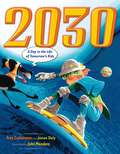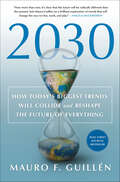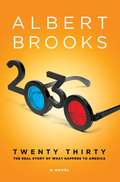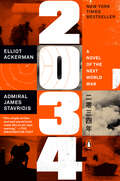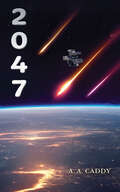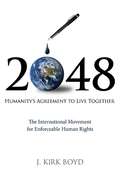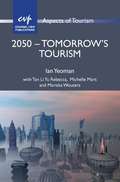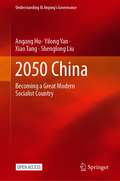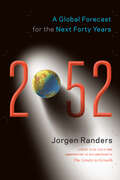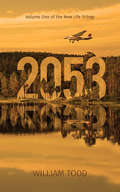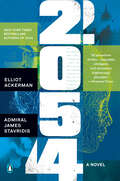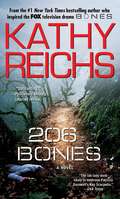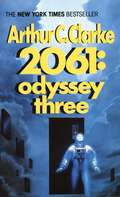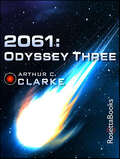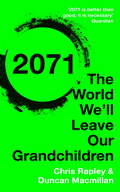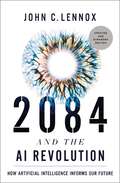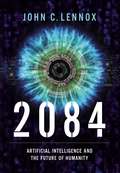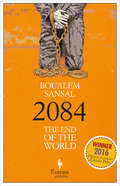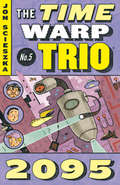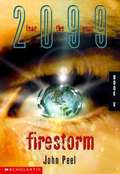- Table View
- List View
2030: A Day in the Life of Tomorrow's Kids
by James Daly Amy ZuckermanWinner of the 2012 Grand Canyon Reader Award for a Non-fiction bookGlobal events and new technology change how we live from moment to moment. So, what will our world be like in twenty years? Come take a look as futurists Amy Zuckerman and James Daly examine what a kid?s daily life might be like in the year 2030. Inspired and informed by trends and scientifi c and technological research, 2030 is not only a peek at some cool future gadgets (talking dog collars, cars that drive themselves), but also a thoughtful examination of how our lives might be impacted as we adjust to environmental change.
2030: How Today's Biggest Trends Will Collide and Reshape the Future of Everything
by Mauro F. GuillénAN INTERNATIONAL BESTSELLERWall Street Journal BestsellerA Porchlight Book BestsellerFinancial Times Best Books of 2020Yahoo Finance Favorite Business Books of 2020 JP Morgan NextList 2021 selection"Bold, provocative...illuminates why we’re having fewer babies, the middle class is stagnating, unemployment is shifting, and new powers are rising.”—ADAM GRANTThe world is changing drastically before our eyes—will you be prepared for what comes next? A groundbreaking analysis from one of the world's foremost experts on global trends, including analysis on how COVID-19 will amplify and accelerate each of these changes.Once upon a time, the world was neatly divided into prosperous and backward economies. Babies were plentiful, workers outnumbered retirees, and people aspiring towards the middle class yearned to own homes and cars. Companies didn't need to see any further than Europe and the United States to do well. Printed money was legal tender for all debts, public and private. We grew up learning how to "play the game," and we expected the rules to remain the same as we took our first job, started a family, saw our children grow up, and went into retirement with our finances secure.That world—and those rules—are over.By 2030, a new reality will take hold, and before you know it:- There will be more grandparents than grandchildren- The middle-class in Asia and Sub-Saharan Africa will outnumber the US and Europe combined- The global economy will be driven by the non-Western consumer for the first time in modern history- There will be more global wealth owned by women than men- There will be more robots than workers- There will be more computers than human brains- There will be more currencies than countriesAll these trends, currently underway, will converge in the year 2030 and change everything you know about culture, the economy, and the world.According to Mauro F. Guillen, the only way to truly understand the global transformations underway—and their impacts—is to think laterally. That is, using “peripheral vision,” or approaching problems creatively and from unorthodox points of view. Rather than focusing on a single trend—climate-change or the rise of illiberal regimes, for example—Guillen encourages us to consider the dynamic inter-play between a range of forces that will converge on a single tipping point—2030—that will be, for better or worse, the point of no return.2030 is both a remarkable guide to the coming changes and an exercise in the power of “lateral thinking,” thereby revolutionizing the way you think about cataclysmic change and its consequences.
2030: The Real Story of What Happens to America
by Albert BrooksJune 12, 2030 started out like any other day in memory -- and by then, memories were long. Since cancer had been cured fifteen years before, America's population was aging rapidly. That sounds like good news, but consider this: millions of baby boomers, with a big natural predator picked off, were sucking dry benefits and resources that were never meant to hold them into their eighties and beyond. Young people around the country simmered with resentment toward "the olds" and anger at the treadmill they could never get off of just to maintain their parents' entitlement programs. But on that June 12th, everything changed: a massive earthquake devastated Los Angeles, and the government, always teetering on the edge of bankruptcy, was unable to respond. The fallout from the earthquake sets in motion a sweeping novel of ideas that pits national hope for the future against assurances from the past and is peopled by a memorable cast of refugees and billionaires, presidents and revolutionaries, all struggling to find their way. In 2030, the author's all-too-believable imagining of where today's challenges could lead us tomorrow makes gripping and thought-provoking reading.
2034: A Novel of the Next World War
by Elliot Ackerman Admiral James Stavridis USNAn instant New York Times Bestseller!&“Consider this another vaccine against disaster. Fortunately, this dose won't cause a temporary fever—and it happens to be a rippingly good read.&” —Wired&“This crisply written and well-paced book reads like an all-caps warning for a world shackled to the machines we carry in our pockets and place on our laps . . ." —The Washington PostFrom two former military officers and award-winning authors, a chillingly authentic geopolitical thriller that imagines a naval clash between the US and China in the South China Sea in 2034—and the path from there to a nightmarish global conflagration.On March 12, 2034, US Navy Commodore Sarah Hunt is on the bridge of her flagship, the guided missile destroyer USS John Paul Jones, conducting a routine freedom of navigation patrol in the South China Sea when her ship detects an unflagged trawler in clear distress, smoke billowing from its bridge. On that same day, US Marine aviator Major Chris "Wedge" Mitchell is flying an F35E Lightning over the Strait of Hormuz, testing a new stealth technology as he flirts with Iranian airspace. By the end of that day, Wedge will be an Iranian prisoner, and Sarah Hunt's destroyer will lie at the bottom of the sea, sunk by the Chinese Navy. Iran and China have clearly coordinated their moves, which involve the use of powerful new forms of cyber weaponry that render US ships and planes defenseless. In a single day, America's faith in its military's strategic pre-eminence is in tatters. A new, terrifying era is at hand.So begins a disturbingly plausible work of speculative fiction, co-authored by an award-winning novelist and decorated Marine veteran and the former commander of NATO, a legendary admiral who has spent much of his career strategically outmaneuvering America's most tenacious adversaries. Written with a powerful blend of geopolitical sophistication and human empathy, 2034 takes us inside the minds of a global cast of characters--Americans, Chinese, Iranians, Russians, Indians--as a series of arrogant miscalculations on all sides leads the world into an intensifying international storm. In the end, China and the United States will have paid a staggering cost, one that forever alters the global balance of power. Everything in 2034 is an imaginative extrapolation from present-day facts on the ground combined with the authors' years working at the highest and most classified levels of national security. Sometimes it takes a brilliant work of fiction to illuminate the most dire of warnings: 2034 is all too close at hand, and this cautionary tale presents the reader a dark yet possible future that we must do all we can to avoid.
204 Rosewood Lane
by Debbie MacomberOlivia LockhartCedar Cove, WashingtonDear Reader,If you've been to Cedar Cove before, you've probably met my friend Grace Sherman. You can usually find her at home-she lives at 204 Rosewood Lane-or at the public library, where she works. Like me, she grew up in this town and she's raised two daughters here. But did you hear that about six months ago, her husband disappeared? Just...disappeared. Where's Dan? Why did he go? Who's he with? Will Grace ever find out?I hope that all of us, her family and friends, are bringing her comfort during this difficult time. Comfort and a sense of shelter. I'm continually reminded that life can and does go on. For instance, everyone's been discussing weddings and babies lately. Justine, my daughter, rather impulsively got married a little while ago. Grace's daughter Kelly recently had a baby. Unfortunately, she refuses to accept that Dan might not return to see his first grandchild. Grace's older daughter, Maryellen, is more realistic. Grace thinks she's seeing a new man but for some reason won't say who it is.Then there's Jack Griffin, our local newspaper editor, the man I've been seeing. And...well, I have lots to tell you. Come on over and we'll talk!Olivia
204 Rosewood Lane (Cedar Cove #2)
by Debbie MacomberLove always finds a way in this heartwarming second installment in the Cedar Cove series, only from #1 New York Times bestselling author Debbie MacomberJudge Olivia Lockhart’s plate is full. Her hometown of Cedar Cove is the kind of community that’s always relied on each other for support, but lately it seems everybody needs somebody to lean on, especially Olivia’s best friend, Grace Sherman, whose husband disappeared six months prior. Thirty-five years together, then—just gone. Moving forward without closure is hardly ideal, but for librarian Grace, it may be time to start a new chapter.For Olivia, helping her good friend start over is just the beginning. There are enough marriages, separations, and babies being born in Cedar Cover to keep anyone on their toes. And when Olivia’s ex-husband makes it clear he wants her back, it throws a serious wrench at her on-again, off-again relationship with newspaper editor Jack Griffin. Sometimes the right path isn’t always clear, but finding the courage to follow your heart will lead you right where you belong.Previously published
2047
by A. A. CaddyNatasha, raised in an orphanage in Hiroshima, has always been searching for the truth about her past. But when she becomes one of two female commanders on a space lab tracking two massive asteroids, she finds herself in the middle of a mystery that threatens to end life as we know it. With the Earth on the brink of destruction, everyday objects are appearing in the strangest places – over 250,000 years old, and seemingly out of time. From digital watches in museums to modern spectacles in ancient Egyptian digs, something is not right. And as the asteroids change direction, heading straight for the planet, a third, massive, metallic sphere appears. Will Natasha and the team be able to stop the impending extinction event, or will the Earth be lost forever?
2048: Humanity's Agreement To Live Together: The International Movement for Enforceable Human Rights
by J. Kirk BoydCreating an enforceable international guarantee of basic human rightsOutlines the basics of a universally acceptable agreementShows what everyone can do to make this agreement a realityIn 1948 the United Nations General Assembly adopted the Universal Declaration of Human Rights, a deeply inspiring document that has been translated into over 300 languages and dialects. But because its provisions are not enforceable, its promise has not been fulfilled. Human rights violations continue in every corner of the globe, the cause of countless individual tragedies as well as large-scale disasters like war, poverty and environmental ruin.It’s time to take the next step. 2048 sets out a visionary, audacious, but, Kirk Boyd insists, achievable goal: drafting an enforceable international agreement that will allow the people of the world to create a social order based upon human rights and the rule of law. Boyd and the 2048 Project aim to have this agreement, the International Convention on Human Rights, in place by the 100th anniversary of the Universal Declaration.Written documents have always played a key role in advancing human rights: the Code of Hammurabi, the Magna Carta, the Declaration of Independence. The express purpose of the International Convention is to safeguard what Boyd calls the Five Freedoms, adding freedom for the environment to Franklin Roosevelt’s famous Four Freedoms: freedom of speech, freedom of religion, freedom from want, and freedom from fear.Boyd skillfully anticipates objections to the notion of a universal and enforceable written agreement—that it would be culturally insensitive, too expensive, unacceptably limit national sovereignty—and convincingly answers them. In fact some promising first steps have already been taken. He describes existing transnational agreements with effective compliance mechanisms that can serve as models.But Boyd wants to inspire more than argue. In 2048 he urges everyone to participate in the drafting of the agreement via the 2048 website and describes specific actions people can take to help make it a reality. “What you do with what you read” Boyd writes, “is as important as what this book says.” Little by little, working together creatively with the tools now available, we can take the next step forward in the evolution of human rights.
2050 Tomorrow's Tourism
by Ian YeomanIn 2050, it is predicted that 4.7bn or nearly 50% of the world's population will take an international holiday. But can humankind meet that forecast given the issues of ageing populations, peak oil, the global financial crisis and climate change? This book constructs scenarios from Shanghai to Edinburgh, Seoul to California encompassing complex topics such as human trafficking, conferences, transport, food tourism or technological innovation. This is a blue skies thinking book about the future of tourism and a thought-provoking analytical commentary.
2050 China: Becoming a Great Modern Socialist Country (Understanding Xi Jinping’s Governance)
by Angang Hu Yilong Yan Xiao Tang Shenglong LiuThis book is open access under a CC BY-NC-ND 4.0 license.This book is arranged and developed around the theme of “2050 China,” it analyzes the factors and advantages of the Chinese road to socialist modernization, explores and summarizes the development goal and the basic logic of the socialist modernization of China, and further shows the general basis of the primary stage of socialism. According to the report delivered at the 19th Party Congress, and according to the “two-stage” strategic plan, this book looks ahead in detail to the overarching objective and sub-objectives of essentially achieving socialist modernization by 2035, discusses the building of a great modern socialist country in all respects from the perspective of the Party’s six-sphere integrated plan of economic, political, cultural, social, ecological civilization, and national defense construction, and provides policy proposals. This book also analyzes the influence and the effect of the socialist modernization with Chinese characteristics on the world and it further presents the third centenary goal. In conclusion, this book is an elaboration of the work of the Institute for Contemporary China Studies, Tsinghua University. It reflects the intellectual innovation in the authors’ research on contemporary China, as well as the authors’ foresight and predictions about China’s future development.
2052: A Global Forecast for the Next Forty Years
by Jorgen RandersWith clarity, conscience, and courage, global-systems pioneer Jorgen Randers and his distinguished contributors map the forces that will shape the next four decades.Forty years ago, The Limits to Growth study addressed the grand question of how humans would adapt to the physical limitations of planet Earth. It predicted that during the first half of the 21st century the ongoing growth in the human ecological footprint would stop-either through catastrophic "overshoot and collapse"-or through well-managed "peak and decline."So, where are we now? And what does our future look like? In the book 2052, Jorgen Randers, one of the coauthors of Limits to Growth, issues a progress report and makes a forecast for the next forty years. To do this, he asked dozens of experts to weigh in with their best predictions on how our economies, energy supplies, natural resources, climate, food, fisheries, militaries, political divisions, cities, psyches, and more will take shape in the coming decades. He then synthesized those scenarios into a global forecast of life as we will most likely know it in the years ahead.The good news: we will see impressive advances in resource efficiency, and an increasing focus on human well-being rather than on per capita income growth. But this change might not come as we expect. Future growth in population and GDP, for instance, will be constrained in surprising ways-by rapid fertility decline as result of increased urbanization, productivity decline as a result of social unrest, and continuing poverty among the poorest 2 billion world citizens. Runaway global warming, too, is likely.So, how do we prepare for the years ahead? With heart, fact, and wisdom, Randers guides us along a realistic path into the future and discusses what readers can do to ensure a better life for themselves and their children during the increasing turmoil of the next forty years.
2053: Volume One of the New Life Trilogy
by William ToddThe novel 2053 is the first volume of the New Life trilogy. This book sets the scene for science fiction sequels. 2053 is a story of human frailty, endeavour and ambition with episodes of murder, sexual indiscretion and exploitation taking place in a futuristic world. The novel is quick paced with apparently unrelated events leading to the search for a mysterious girl. Parallel to the search, the story follows the preparedness of the spacecraft New Life.
2054: A Novel
by Elliot Ackerman Admiral James Stavridis USNFrom the acclaimed authors of the runaway New York Times bestseller 2034 comes another explosive work of speculative fiction set twenty years further in the future, at a moment when a radical leap forward in artificial intelligence combines with America&’s violent partisan divide to create an existential threat to the country, and the worldIt is twenty years after the catastrophic war between the United States and China that brought down the old American political order. A new party has emerged in the US, one that&’s held power for over a decade. Efforts to cement its grip have resulted in mounting violent resistance. The American president has control of the media, but he is beginning to lose control of the streets. Many fear he&’ll stop at nothing to remain in the White House. Suddenly, he collapses in the middle of an address to the nation. After an initial flurry of misinformation, the administration reluctantly announces his death. A cover-up ensues, conspiracy theories abound, and the country descends into a new type of civil war.A handful of elite actors from the worlds of computer science, intelligence, and business have a fairly good idea what happened. All signs point to a profound breakthrough in AI, of which the remote assassination of an American president is hardly the most game-changing ramification. The trail leads to an outpost in the Amazon rainforest, the last known whereabouts of the tech visionary who predicted this breakthrough. As some of the world&’s great powers, old and new, state and nonstate alike, struggle to outmaneuver one another in this new Great Game of scientific discovery, the outcome becomes entangled with the fate of American democracy.Combining a deep understanding of AI, biotech, and the possibility of a coming Singularity, along with their signature geopolitical sophistication, Elliot Ackerman and Admiral James Stavridis have once again written a visionary work. 2054 is a novel that reads like a thriller even as it demands that we consider the trajectory of our society and its potentially calamitous destination.
206 Bones: A Novel (Temperance Brennan #12)
by Kathy ReichsThe #1 New York Times bestselling author and producer of the Fox television hit, Bones, returns with a spectacular new Tempe Brennan novel. <P> There are 206 bones in the human body. Forensic anthropologists know them intimately, can read in them stories of brief or long lives and use them to reconstruct every kind of violent end. 206 Bones opens with Tempe regaining consciousness and discovering that she is in some kind of very small, very dark, very cold enclosed space. She is bound, hands to feet. Who wants Tempe dead, or at least out of the way, and why? Tempe begins slowly to reconstruct... Tempe and Lieutenant Ryan had accompanied the recently discovered remains of a missing heiress from Montreal to the Chicago morgue. Suddenly, Tempe was accused of mishandling the autopsy -- and the case. Someone made an incriminating phone call. Within hours, the one man with information about the call was dead. Back in Montreal, the corpse of a second elderly woman was found in the woods, and then a third. Seamlessly weaving between Tempe's present-tense terror as she's held captive and her memory of the cases of these murdered women, Reichs conveys the incredible devastation that would occur if a forensic colleague sabotaged work in the lab. The chemistry between Tempe and Ryan intensifies as this complex, riveting tale unfolds.
2061: Odyssey Three
by Arthur C. ClarkeThe third book in Clarke's beloved Space Odyssey series, 2061: Odyssey Three returns to Heywood Floyd, survivor of two previous encounters with the mysterious monoliths and the alien intelligences behind them. Floyd is chosen as one of a handful of celebrity guests to witness the first manned touchdown on the surface of Halley's Comet on the privately-owned spaceship Universe. <P> But the touchdown is not fated to go as planned. On Jupiter's moon Europa, which has undergone a transformation after events at the end of 2010: Odyssey Two, scientists have spotted the sudden growth of a gigantic, asymmetrical mountain determined to be one single enormous diamond-a fragment of Jupiter's core. The Universe's sister ship, Galaxy, is hijacked and forced to crash into Europa's ocean-and the Universe is diverted from its original mission to rescue the crew. <P> In this book, Heywood Floyd must once again survive an encounter with HAL, David Bowman, and the mysterious monolith-building race with its own hidden agenda-that will shape the destiny of the human race.
2061: Odyssey Three (Space Odyssey Series #3)
by Arthur C. ClarkeThis New York Times–bestselling chapter in the Hugo Award–winning Space Odyssey series is &“intriguing and satisfying . . . the all-round best Odyssey so far&” (Kirkus Reviews). The third book in Clarke&’s beloved Space Odyssey continues the story of Heywood Floyd, survivor of two previous encounters with the mysterious monoliths and the alien intelligences behind them. Floyd is chosen as one of a handful of celebrity guests to witness the first manned touchdown on the surface of Halley&’s Comet on the privately-owned spaceship Universe. But on Jupiter&’s moon Europa, scientists have spotted the sudden appearance of a single diamond the size of a mountain—a fragment of Jupiter&’s core. When the spaceship Galaxy is hijacked and forced to crash into Europa&’s ocean, the Universe is diverted from its original mission to rescue the crew. Now Heywood Floyd must once again survive an encounter with HAL, David Bowman, and the mysterious monolith-building race with its own inscrutable agenda to shape the destiny of the human race.
2071: The World We'll Leave Our Grandchildren
by Duncan Macmillan Chris RapleyHow has the climate changed in the past? How is it changing now? How do we know?And what kind of a future do we want to create?
2071: The World Well Leave Our Grandchildren
by Duncan Macmillan Chris RapleyHow has the climate changed in the past? How is it changing now? How do we know?And what kind of a future do we want to create?
2076: The American Tricentenial
by Edward BryantA collection of 14 science fiction short stories about what the United States might be like in 2076 by Peter S. Alterman, Karl Hansen, Carol Emshwiler, Jo Ann Harper, Robert Crais, Marge Piercy, William Jon Watkins, James Stevens, Harlan Ellison, Sonya Dorman, Vonda N. McIntyre, Peter Dillingham, Robert E. Vardeman, Jeff Slaten, James Sallis, David Lunde and Patrick Henry Prentice
2084 and the AI Revolution, Updated and Expanded Edition: How Artificial Intelligence Informs Our Future
by John C. LennoxWill technology change what it means to be human?You don't have to be a computer scientist to have discerning conversations about artificial intelligence and technology. We all wonder where we're headed. Even now, technological innovations and machine learning have a daily impact on our lives, and many of us see good reasons to dread the future. Are we doomed to the surveillance society imagined in George Orwell's 1984?Mathematician and philosopher John Lennox believes that there are credible responses to the daunting questions that AI poses, and he shows that Christianity has some very serious, sensible, evidence-based things to say about the nature of our quest for superintelligence.This newly updated and expanded edition of 2084 will introduce you to a kaleidoscope of ideas:Key recent developments in technological enhancement, bioengineering, and, in particular, artificial intelligence.Consideration of the nature of AI systems with insights from neuroscience.The way AI is changing how we communicate, implications for medicine, manufacturing and the military, its use in advertising and automobiles, and education and the future of work.How data is used today for surveillance, thought control.The rise of virtual reality and the metaverse.The transhumanist agenda and longtermism.The agreements and disagreements that scientists and experts have about the future of AI.The urgent need for regulation and control in light of the development of large language transformers like CHATGPT.Key insights from Scripture about the nature of human beings, the soul, our moral sense, our future, and what separates us from machines. In straight-forward, accessible language, you will get a better understanding of the current capacity of AI, its potential benefits and dangers, the facts and the fiction, as well as possible future implications.Since the questions posed by AI, daunting as they might be, affect most of us, they demand answers. 2084 and the AI Revolution, Updated and Expanded Edition has been written to challenge and ignite the curiosity of all readers. Whatever your worldview, Lennox provides clear information and credible answers that will bring you real hope for the future of humanity.
2084: Artificial Intelligence and the Future of Humanity
by John C. LennoxYou don't have to be a computer scientist to get involved in the discussion about where artificial intelligence and technology are going.What will the year 2084 hold for you--for your friends, for your family, and for our society? Are we doomed to the grim dystopia imagined in George Orwell&’s 1984?In 2084, scientist and philosopher John Lennox will introduce you to a kaleidoscope of ideas: the key developments in technological enhancement, bioengineering, and, in particular, artificial intelligence. You will discover the current capacity of AI, its advantages and disadvantages, the facts and the fiction, as well as potential future implications.The questions posed by AI are open to all of us. And they demand answers. A book that is written to challenge all readers, no matter your worldview, 2084 shows how the Christian worldview, properly understood, can provide evidence-based, credible answers that will bring you real hope for the future of humanity.
2084: The End of the World
by Sansal BoualemWINNER OF THE FRENCH ACADEMY GRAND PRIXA tribute to George Orwell's 1984 and a cry of protest against totalitarianism of all kinds, Sansal's 2084 tells the story of a near future in which religious extremists have established an oppressive caliphate where autonomus thought is forbidden.It is the year 2084. In the kingdom of Abistan—named after the prophet Abi, earthly messenger of the god Yolah—citizens submit to a single god, demonstrating their devotion by kneeling in prayer nine times a day. Autonomous thought has been banned, remembering is forbidden, and an omnipresent surveillance system instantly informs the authorities of every deviant act, thought, or idea. The kingdom is blessed and its citizens are happy, filled with a sense of purpose and piety. Those who are not—the heretics—are put to death by stoning or beheading in city squares. But Ati has met people who think differently; in ghettos and caves, hidden from the authorities, exist the last living heretics and free-thinkers of Abistan. Under their influence, Ati begins to doubt. He begins to think. Now, he will have to defend his thoughts with his life. "[In 2084] Sansal dared to go much further than I did," said Michel Houellebecq, the controversial novelist most recently of Submission. 2084 is a cry of freedom, a call to rebellion, a gripping satirical novel of ideas, and an indictment of the religious fundamentalism that, with its hypocrisy and closed-mindedness, threatens our modern democracies and the ideals on which they are founded.From the Trade Paperback edition.
2095 (Time Warp Trio #5)
by Jon ScieszkaEveryone's favorite time-travelers are changing their styles! The Time Warp Trio series now features a brand-new, eye-catching design, sure to appeal to longtime fans, and those new to Jon Scieszka's wacky brand of humor.
2099 Firestorm (Medieval Mysteries #6)
by John PeelTristan and Genia fight to stop Tristan's evil clone, Devon, from destroying Earth and the colonized moon, and try to thwart Quietus' takeover of Mars.
20: The Best of the Drue Heinz Literature Prize
by John Edgar Wideman"20" is a culmination of twenty years of excellence in short fiction writing. It celebrates the hopes, dreams, and individual successes of all the authors who participated in the contest through the past two decades. The Drue Heinz Literature Prize's mission supports and recognizes those writers brave enough to tackle the challenging genre of short fiction. The stories contained in this volume stand as proof: mission accomplished.
